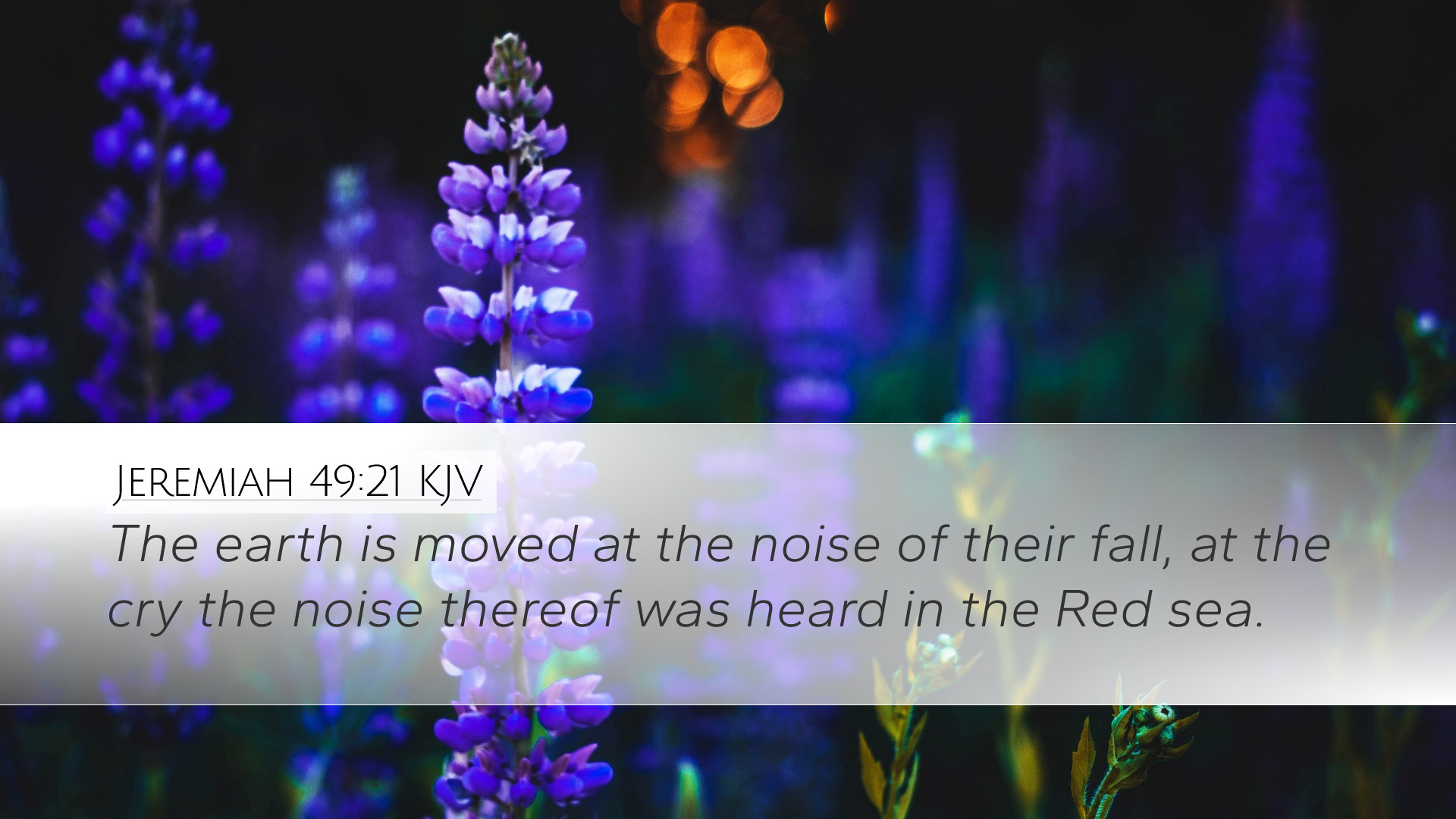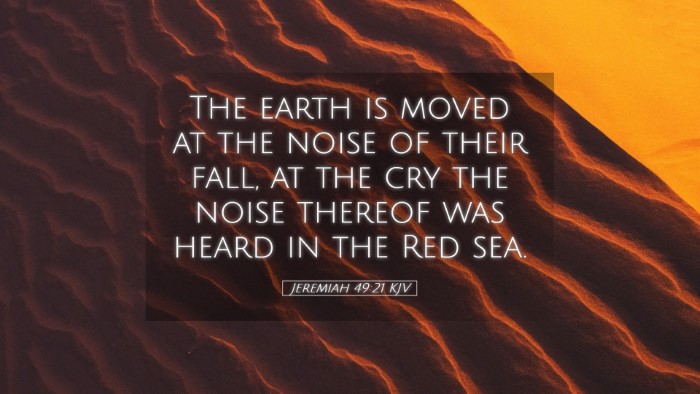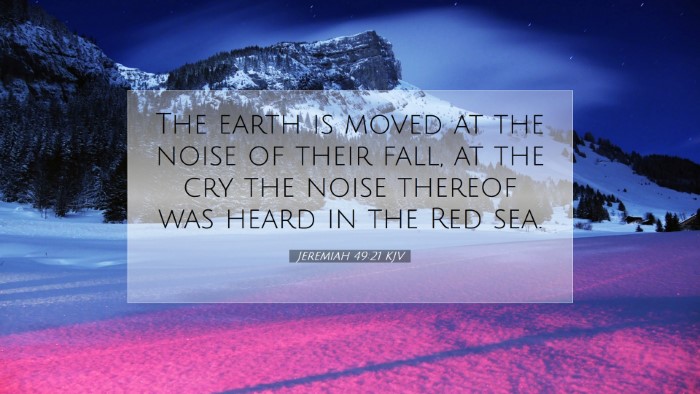Jeremiah 49:21 Commentary
Verse Context: Jeremiah 49:21 states, "The earth is moved at the noise of their fall, at the cry of the noise thereof was heard in the Red Sea." This verse is part of a prophecy against Edom, a nation that had a long history of conflict with Israel. The surrounding verses set the tone for God's declaration of judgment upon Edom, emphasizing the seriousness of their impending fall.
Insights from Public Domain Commentaries
Matthew Henry's Commentary
Matthew Henry elaborates on the devastation faced by Edom, highlighting that the noise of their fall is so great that it reverberates across the land, causing the earth itself to tremble. He notes that this is not only a local judgment but one that attracts the attention of the nations surrounding them. The imagery here suggests a cosmic reaction to the moral failing of Edom, indicating a theological principle where divine judgment has wide-reaching implications.
Henry also connects this to the broader theme of God’s sovereignty over nations. Edom’s downfall serves as a historical warning, reminding the nations that pride and hostility towards God’s people eventually leads to destruction. He emphasizes the emotional weight this verse carries, suggesting that the cry heard in the Red Sea symbolizes not just a geographical reaction but a mournful awareness of the consequences of sin.
Albert Barnes' Notes
Albert Barnes approaches this text by discussing the metaphorical language used in Jeremiah. The 'noise' of Edom's fall is described with vivid imagery to communicate the terror and desolation accompanying God's judgment. He suggests that such phrases illustrate the idea that the natural world responds to divine acts, much like how a storm would follow a disturbance in nature.
Barnes emphasizes the 'Red Sea' in the narrative, interpreting it as a symbol of tragedy and loss. The cries heard serve as a reminder of God's judgment on enemies of His people, and he frames this within the larger narrative of Israel's eventual restoration. By considering the geographical and historical significance of Edom's location, Barnes showcases the importance of understanding the text in relation to the ancient Near Eastern context.
Adam Clarke's Commentary
Adam Clarke offers a detailed linguistic analysis of the terms used in Jeremiah 49:21. He notes that the 'earth is moved' indicates not only a physical but also a spiritual upheaval. Clarke passionately relates this to the idea that the judgment of God brings about spiritual chaos that can be felt throughout creation. This is a poignant reminder of the interconnectedness of humanity and the divine, wherein human actions have cosmic repercussions.
Moreover, Clarke highlights the calamity that befalls Edom, arguing that their pride and resistance against God's will result in their ultimate downfall. This poignant commentary illustrates how sin leads to suffering, and the cries from the Red Sea illustrate the fear and despair that accompany the realization of loss. Clarke's insights connect this verse to contemporary discussions on the justice of God, arguing that divine retribution is not merely punitive but serves to restore order and righteousness.
Theological Implications
The broad consensus among these commentators is that Jeremiah 49:21 serves as a rich theological tapestry that speaks to themes of judgment, pride, and divine sovereignty. This verse illustrates how the fall of a nation has ramifications that resonate far beyond its borders, encapsulating a universal truth evidenced throughout Scripture.
- Judgment: The text serves as a stark reminder of God's justice. Edom, viewed as an enemy of Israel, experiences the consequences of its actions, indicating that even nations must respond to God's moral order.
- Pride and Fall: The Edomites' hubris and oppressive actions are consistently met with divine rebuke. This dynamic between pride and downfall is a recurring biblical theme and serves as a cautionary tale for both individuals and nations.
- Crisis and Response: The imagery of a cosmic disturbance at the announcement of judgment serves to illustrate the profound seriousness with which God views wickedness and injustice.
- Hope and Restoration: While the verse depicts judgment, it also sets the stage for hope. In the context of Israel's future restoration, judgments against Edom signal a path to redemption and the eventual vindication of God's people.
Practical Applications
This commentary invites believers, theologians, and scholars to reflect on the implications of their actions in light of God's moral government. The noted insights can encourage contemporary readers to avoid the pitfalls of pride, urging them instead to foster humility and a spirit of repentance.
Furthermore, understanding the context in which this prophecy was given aids in grasping the meaning of God’s justice in today’s world. It challenges individuals and nations alike to live in accordance with divine principles, reminding us that history is shaped by the moral choices made by its agents.


